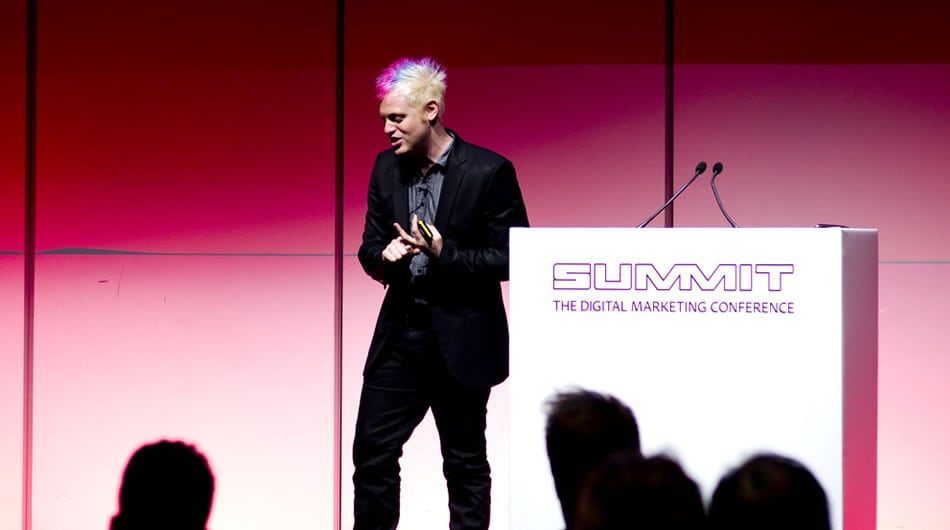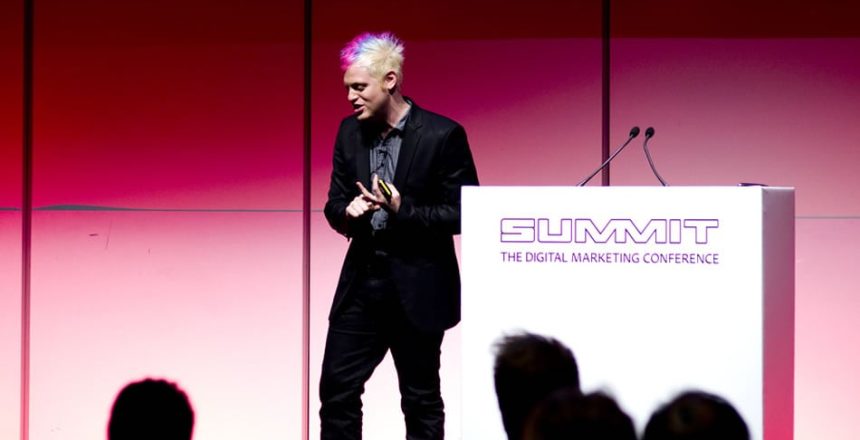Having begun his work in social media by designing and building a mobile social network Marc Blinder has since been involved with some of the most successful Facebook marketing campaigns of all time. Today he’s part of Adobe’s Marketing Cloud Strategy team in London and is a frequent speaker across Europe on social marketing.

How did you get into social marketing?
Even though I always loved technology, I studied politics at Princeton University. After university, I spent five years working on political campaigns in California. I loved social media, because it seemed like a truly democratic medium – giving people a voice and opening up two-way conversations between companies and consumers. At Context Optional, where I worked before Adobe acquired us, we did a lot of campaigns based on giving consumers a vote on how a company would spend their charitable donations or bringing UGC (user generated content) into a business’s marketing – that’s democratic stuff.
How do you define social marketing?
I don’t have anything that quirky or revolutionary. I define social marketing pretty broadly – everything companies do using social media. It could be anything from customer service to advertising, flash sales (one-day sales), crisis communications, product research, social logins on their website, or a host of other things.
What do you think are the key mistakes that brands make on Twitter?
The most common mistakes brands make on Twitter is not publishing enough. The lifespan of a tweet is so short these days that a lot of brands don’t realise they’re under publishing. This can be especially true when a social team has to manage many accounts. I also think a lot brands can simply be too boring, which is a real shame for the customers, the press and the employees. More engaging content is better for everyone involved.
Why do you think it’s important for brands to create conversation around themselves?
I don’t think it’s important for brands to create conversations around themselves. I think it’s advantageous for brands to create conversations around themselves. Most marketing is trivial stuff – it’s fun or funny or sexy – but it’s still effective. Research has shown the impact of brand marketing time and again, and creating engaging conversations is a great way to stay top of mind.
Which brands or campaigns do you think have done or continue to do content marketing well?
Adobe! I’d recommend liking, following and sharing right away. If you’re reading this interview on a train, just pull the emergency lever – you’ll get a better mobile signal once the train stops.
What is the most common mistake brands tend to make with social media?
I think the most common mistake is under funding social efforts. Because many companies don’t have a good approach to measuring the revenue impact of social media, they end up paying less for social marketing than it’s really worth. If your competitors have more staff, more advertising and better content, be a little nervous, because they may know something you’re not measuring yet.
What are the key benefits of cross solution social marketing?
At Adobe, we’re placing a huge bet on the idea that our customers, who are primarily large enterprises, want a unified marketing cloud instead of point solutions. It’s obviously better from a workflow and ease of use perspective, but we’re also seeing huge impacts in terms of performance, and that cuts across all digital marketing: social, search, experience management, campaign automation, etcetera.
Recently, we integrated Adobe Media Optimizer’s ad buying technology with Adobe Analytics and found that customers who use both see an average 16% uplift in ROI. That’s many millions of pounds of additional revenue that is being created simply through smarter data integration. That’s where we’re focusing our energy: integration driving performance driving ROI. As we’ve already seen, the deeper we integrate the tools, the more powerful the existing data becomes. That’s why cross-solution integration is so important.
Do you think content and social marketing has improved brand promotion?
Definitely. The demand for social media content has driven a much more professional content generation discipline in most companies and that’s yielded higher quality content across the board. The two-way conversation also provides instant negative feedback on bad content, which keeps most brands at a high standard. No one wants to be that negative case study of getting it wrong on social.
Do you think there is a place for print in the future of social media marketing?
I think when we talk about print media we need to be conscious of the fact that print is increasingly going digital. Books, magazines and newspapers are becoming more digital over time – I buy lots of books these days, but they’re all in my phone. Some social platforms are really well-suited to print-like engagement – Twitter, Facebook and Pinterest are great platforms for anything that used to go on a printed page. Half the things that come through my newsfeed are news or magazine type content these days. Ultimately, though, social should be more of a medium for distribution of this content and smart marketers need a mobile strategy for how they create and host this content in apps and responsive sites.
Do you think there is a particular social media platform that is underestimated?
Google+ is really disrespected in the field because it doesn’t have widespread usage, but the fact is, having a good presence on Google+ helps to improve the performance of search campaigns, and Hangouts on Air is an awesome marketing tool for doing video on the cheap. It’s not a sexy platform, but the cost/benefit analysis is really good.
You speak at a lot of conferences – what is the most common question you get asked?
The most common question I get asked is “is your hair always like that?” The answer is yes. The most common question I’d like to be asked is “how do we share the productivity gains of an increasingly automated workforce,” but that hasn’t come up at a lot of marketing conferences recently. People should really be thinking about it though. We’re all part of the same economy and the shifting landscape effects marketing just as much as everything else.



